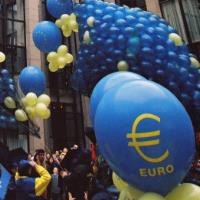(BRUSSELS) – The euro, Europe’s common currency, turned 20 on 1 January 2019. 11 EU states launched the euro in January 1999, introducing a shared monetary policy under the European Central Bank.
The historic moment was a milestone on a journey driven by an ambition of ensuring stability and prosperity in Europe.
Today, the euro is the currency of 340 million Europeans in 19 EU Member States. It has brought benefits to European households, businesses and governments alike: stable prices, lower transaction costs, protected savings, more transparent and competitive markets, and increased trade.
Some 60 countries around the world link their currencies to the euro in one way or another, while other EU Member States are expected to join the euro area once the criteria are met.
“The euro was a logical and necessary consequence of the single market,” said the President of the European Central Bank Mario Draghi: “It makes it easier to travel, trade and transact within the euro area and beyond.”
He added that the ECB contributed to the well-being of euro area citizens “by developing safe, innovative banknotes, promoting secure payment systems, supervising banks to ensure they are resilient and overseeing financial stability in the euro area.”
The journey towards launch of the euro started with the global monetary turmoil of the 1970s and 1980s, which exposed individual European countries and called for European solutions.
With the establishment of a single market, it would make it easier to work and trade if Europeans could start to use a single currency. The agreement that political leaders signed in 1992 in Maastricht brought the single currency to life. The signing of the Maastricht Treaty became a symbolic moment in the move towards the euro. In 1994, the European Monetary Institute (EMI) started its preparatory work in Frankfurt for the European Central Bank (ECB) to assume its responsibility for monetary policy in the euro area. As a result, on 1 June 1998, the ECB became operational.
The euro was launched on 1 January 1999, becoming the official currency of 11 Member States, with monetary policy responsibilities given to the European Central Bank and the Eurosystem.
After three years of appearing on people’s bank statements alongside national currencies, euro banknotes and coins arrived in 12 countries, which thereby participated in the largest currency changeover in history. The original members were Austria, Belgium, Finland, France, Germany, Ireland, Italy, Luxembourg, Netherlands, Spain and Portugal. Greece joined in 2001. Since then, a further seven Member States have introduced the euro (Cyprus, Estonia, Latvia, Lithuania, Malta, Slovakia and Slovenia).



